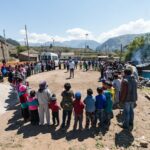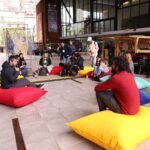- March 24, 2023
- Benjamin Pino

Commemorating the International Day for the Elimination of Racial Discrimination
March is a special month in the fight against xenophobia and racial discrimination. Although this is an everyday task, this commemorative date invites us to reflect on the effects of discriminatory discourse and encourages us to continue working every day to change the narrative.
March 21 marks the International Day for the Elimination of Racial Discrimination, whose origin dates back to the terrible Sharpeville massacrein South Africa in 1960, when police opened fire on a peaceful demonstration against apartheid laws that segregated and controlled the movement of the country’s black population.
In the speech of the this year’s commemorationthe President of the United Nations General Assembly, Csaba Kőrösi, underlined the need for unceasing efforts to combat racism, because the legacies of racist systems of slavery, apartheid and segregation still resonate in communities, institutions and in our minds.
“Like a virus, racism mutates and adapts to different times and contexts. It is said that ‘racism is like a Cadillac, every year there is a new model’. Indeed, its manifestations and symptoms may change, but the extent of its damage remains intact,” Kőrösi said.
In addition, the chairman explained that algorithms can perpetuate racial stereotypes and racial prejudicewhile technology can be used to increase unlawful surveillance and reinforce discriminatory practices..
Let’s change the narrative
Some
innovations accelerated by Hola America
work to combat xenophobia. One of them is the
Xenophobia Barometer
which systematizes, analyzes and disseminates analyses of Internet publications on the migrant population.
With this, the project seeks to understand in what ways migration issues are being talked about, and how much xenophobic discourses are influencing the decision making of governmental entities.and how much xenophobic discourse is influencing the decision making of governmental entities.
On the other hand, the original Hola América project
Hacking Narratives
project highlighted four stories of migrant innovators who are contributing to their countries of arrival and making a positive impact on migrant communities and local governments.


